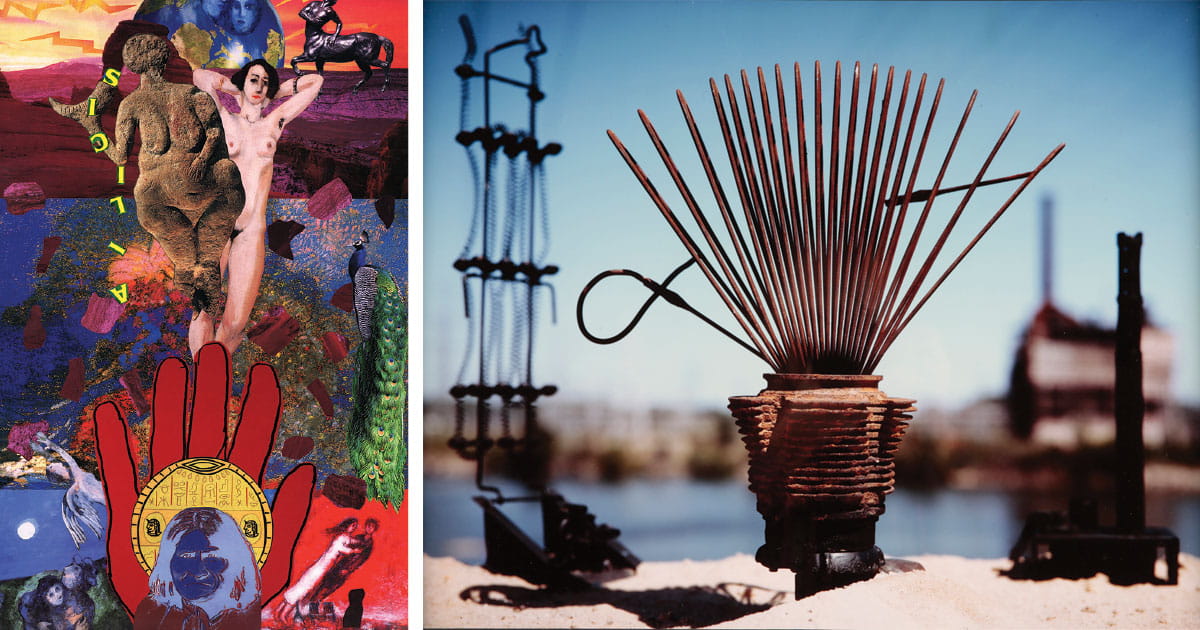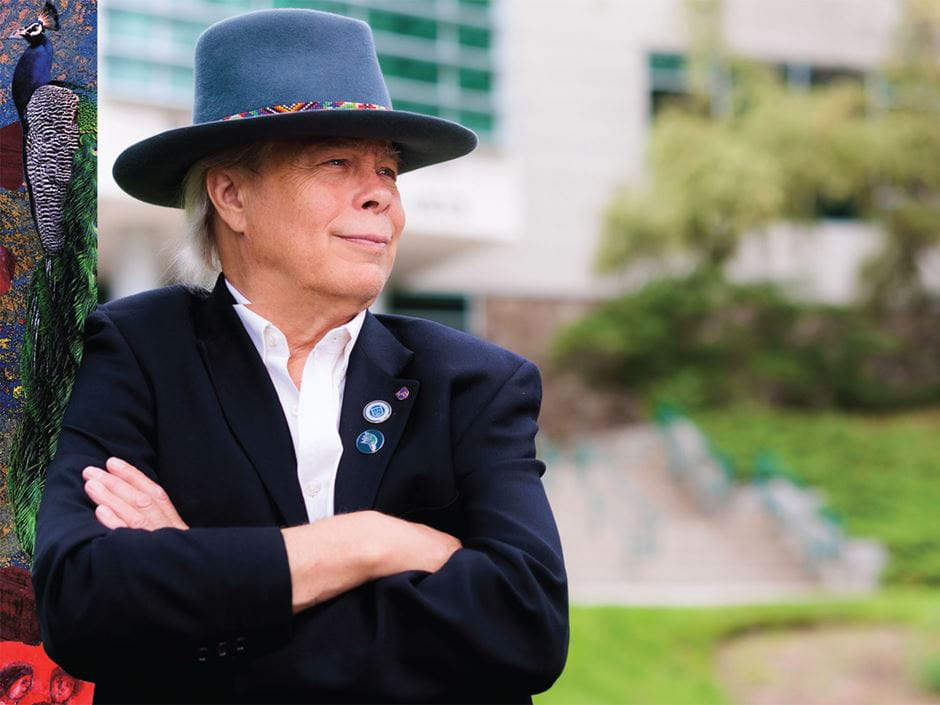Compiled by Sarah Sweeney
Mark Towner was in his element during Reunion Weekend 2023.
For one thing, he’d just received an honorary Doctor of Fine Arts at Commencement. His artwork was also showing in the Heftler Gallery of the School of Visual & Performing Arts and it was the opening night of his exhibit, “An Active Imagination: Mark Towner Thirty-Year Retrospective,” something of a swan song for the dean who, just months before, announced his retirement after 23 years at the helm of the school.
Throughout his tenure, Towner has been a visionary, rabble-rouser, leader, creator, and tireless advocate of the arts and artists—he secured accreditation by the National Association of Schools of Art and Design and grew the school from offering three majors to 10 across visual and performing arts, including graduate degrees. He also promoted and oversaw the design and construction of the Walter J. Manninen Center for the Arts.
“His passion for creativity, innovation, and excellence has inspired countless students and faculty alike,” said Provost Sara Quay.
This fall, the School of Visual & Performing Arts welcomed its largest-ever incoming class—a testament to Towner’s legacy.
We recently sat down with the outgoing dean for a round of 20 questions, and not a moment too soon—by December, he’ll be off on his next adventure.
Why is now the time for you to retire from Endicott?
Twenty-plus years steering the arts at Endicott has been a most rewarding experience, yet this longevity itself suggests that a fresh perspective would be helpful in leading our students and faculty. And it is great to go out with a bang as we welcome the largest class of artists in the history of the College, and as our alumni statistics are off the charts!
What’s next on your bucket list?
For now, selling my house of 25 years, moving to Seattle, and soon enough leaving Endicott College is more than enough to keep me overwhelmed with change. Living a full life keeps the bucket always full.
You’re a hat man. What’s the story behind your hats?
It started simply as a protective measure from sun exposure as my hair thinned. As a creative person who has always appreciated a colorful persona, wearing hats became an opportunity for artistic expression.
How would you describe your time at Endicott?
It’s been so vast and multifaceted that it transcends a single description—but one complex characteristic at the core is the human factor. The concern, nurturing, compassion, collaboration, and interpersonal communication between staff and students have made the College, School of Visual & Performing Arts, and the Walter J. Manninen Center for the Arts a virtual love fest: A family business with all the dynamics, life challenges, personal tragedies, and individual and collective successes.
What legacy do you hope to leave behind here?
I prefer any sort of legacy to be of the school culture and alumni outcomes rather than me as an individual. I hope staff, students, and faculty will look back upon the years we spent together here as inspirational, entrepreneurial, and fun.
What’s the first thing you plan to do upon retiring?
It is more like whirling, twisting, and swiveling than retiring. Instead, I am moving into another creative world and another part of the country.
When did you know you wanted to make art?
From an early age, I gravitated toward creative activities. I never looked at making art as a choice, or something that I wanted to do; I simply did it.
Your art has a very psychedelic and psychological quality to it. Can you speak about that?
The mind is so complex, fascinating, and mysterious! What better world to explore than one’s own individual and collective psyches?! A world of irrationality, sensuality, genius, comedy, deep-seated fears, and soaring joys!

What are some of your influences and inspirations?
My mother was the one who sparked my initial creative force. Psychoanalytical tools from Carl Jung and others are both informative and fun. The relationship between Georgia O’Keeffe and Alfred Stieglitz was inspiring—an unusual paradigm. Other times, inspiration might come from a special combination of lyrics and score, such as the song “Angel of the Morning.”
What does your artmaking process look like?
From one series to another, from one time in my life to another, the process takes different forms. The commonality lies at the core of my psyche—an intuitive drive to explore and express.
What will you miss most about Endicott?
Our collective effort for an important common mission—the education of students. And the people I work with in the School of Visual & Performing Arts and across the campus … that is what I will miss the most.
What’s your idea of happiness?
A life that incorporates friendship, family, and love leaves the door open to happiness. I’ve been fortunate to enjoy the freedom for professional and personal pursuits, which further nurtures a sense of happiness.
If you could have dinner with anyone, dead or alive, who is it?
The earliest known person. A Neanderthal man. The Venus of Willendorf. Adam and Eve.
Who has had the greatest impact on your life?
The Great Mother. The nurturer. Mother Nature. The inquisitive and exploring artist known as my mother. The feminine. The loves of my life. My wife. My love. My boss.
What music inspires you?
Music is often my companion when I make art, and when I prepare dinner. I am attracted to a variety of genres and artists, ranging from The Grateful Dead and their various offshoots to the operas of Verdi and Puccini.
What would your at-bat song be?
How about “On the Road Again” by Willie Nelson? Or “Truckin’” by The Grateful Dead?
What’s something no one knows about you?
Wouldn’t you like to know! If I told you that it would no longer be a secret and someone would know.
For what in your life are you most grateful?
I am grateful for people—my family, friends, lover, neighbors, and colleagues. I have found these relationships to be loving, supportive, and fun! I am not sure how I got so lucky!
What advice do you have for young artists who come to Endicott?
Get involved, meet fellow students in clubs, and engage in activities aside from classroom requirements. Take on leadership roles and reach beyond your previous comfort zone, particularly regarding internships. Push way past your comfort zone.
What advice do you have for the next dean?
Trust the team. Trust the history and paths we have taken to get here. Try to refrain from imposing a comprehensive imprint too soon. Work with the team and witness individual strengths before rewriting the scripts and prescriptions.
